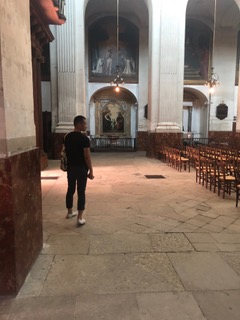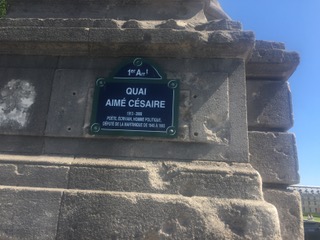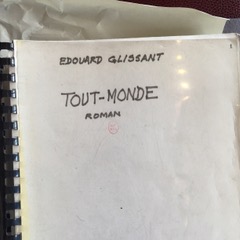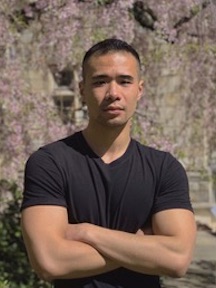By Daniel Myers
Yale doctoral candidate Jason Hong has begun his research for Phi Beta Kappa’s 2019 Walter J. Jensen Fellowship. The Fellowship, awarded to scholars whose work focuses on French language, literature, and culture, is allowing Hong to study in France where he has access to several archives containing rare and unpublished writings of philosophers central to the project.
Hong’s project for the Jensen Fellowship is titled “A Different Worldview: Francophone Literature, Monde, and the Resistance to the Universal.” Through his research, he is seeking “to better understand contemporary debates over French universalism” and to show “that francophone writers have long proposed alternative ideologies to the universal through the concept of monde (‘world’).”
Phi Beta Kappa reached out to see how his work is developing during his first weeks in France.
The Project
On an average day Hong gets up at about six or seven in the morning, writes for a couple of hours, and then visits at least one archive. Hong’s purpose for studying in France is primarily to access the archives of Édouard Glissant, Aimé Césaire, Franz Fanon, and other postcolonial Francophone intellectuals. At the moment, Hong is spending most of his time at the National French Library with the Glissant archive but will also be making trips to the Institute for Contemporary Publishing Archives, the Library of the National Assembly, the Schoelcher Library, and the National Overseas Archives.
Hong is researching postcolonial Francophone writers and their perspectives on French universalism. This angle, for Hong, is an attempt to introduce more nuance into the popular discussion of French universalism; the concept—commonly understood as the national position that French citizens are French first and foremost—is seen as more monolithic than Hong believes it is. Studying French universalism as told by postcolonial Francophone philosophers places his project, in his own words, at the “intersection between translation studies, philosophy, and postcolonial theory.”
The project centers on the French concept of monde, which roughly translates to “world” in English. Unlike “world,” though, Hong says monde carries “more signification than we think.” In our interview, Hong explained why he focuses so heavily on the word monde: “This one word carries a particular signification through French and Francophone history… it is a word that is, fundamentally, unstable.” Hong went on to the heart of the project, noting the word’s instability “gives it a certain ability, a capacity, for theorizing cosmopolitanism.” Hong is studying how these writers transform the concept of monde into a new cosmopolitanism.
When asked why this work is significant for American readers, Hong had this to say: “If you look up the word universalism in the Oxford English Dictionary, it’s going to say that the word came from the French. So the basic Western concept of universalism has its roots in France.” Hong went on to highlight the complexities in how we discuss French-American relations: “We typically think of France as a Universalist country and America as a Multicultural one….What I want to show is even that concept of universalism in France is suspect to attack. I want to throw the cosmopolitanism that these writers have proposed into the debate somewhere between universalism and multiculturalism. So, instead of just two major models of identity that oppose one another, it should be more of a triangle.”
The Scholar
It seems Hong’s work through the Jensen Fellowship is a point on a natural trajectory which began when he started studying French. As an undergraduate at UCLA, Hong chose to study Francophone Literature out of an interest in colonialism and postcolonialism, particularly with regards to the French colonial influence in Asia; over time, he found Francophone Studies to be an entry point into studying power, hegemony, and decolonization. This interest ultimately led Hong to engage in Francophone studies at a global scale, looking at literature from the Caribbean, Sub-Saharan Africa, the Indian Ocean, and Quebec.
In the brief time Hong has spent in France, he already sees where his work is taking him. As a future professor, Hong believes this particular project would be perfect for an advanced undergraduate course in translation theory. “Because my dissertation focuses on how the word monde carries certain significations as an untranslatable, I would be interested in teaching a course on untranslatability,” Hong explained. “It would be on how you have to contextualize a word, understand its history, its philosophy in a way that goes beyond its translation.”
Hong’s work with these writers has also sparked an interest in underrepresented Francophone voices. “There were some very important figures back in the day that we tend to forget now, figures from the Caribbean, Vietnam, and Madagascar,” Hong said. “How could we rethink French postcolonial thought by reincorporating lost figures?”
While Hong’s work is incredibly demanding, he still finds time to experience France. In his free time, Hong is exploring Paris to find bookstores and cafes, a hobby driven by his passion for French literature and a fascination with the differences between French and American cafe culture. He shared some photos from his time in France with us (see below).
Without a doubt, Hong’s time in France is already proving fruitful. Keep an eye out for his work in Contemporary French and Francophone Studies, International Journal of Francophone Studies and Journal of French and Francophone Philosophy where he will be submitting the chapters of this dissertation for publication.
“I was inducted into Phi Beta Kappa when I was a senior at UCLA, which was an incredible honor at the time,” Hong recalled. “I’ve always kept up with Phi Beta Kappa (through the newsletter) and kept an eye out for the various scholarships that the Society supports. The Society’s value of academic excellence has always been an inspiration.”
“The Jensen Fellowship is providing me with financial support to reside in France for the academic year. It’s thanks to the fellowship that I’m able to spend a good amount of time in the archives and to truly immerse myself in my subject,” Hong said. “Financial support in academia, as we all know, can be hard to come by, and to be selected to receive such a boon has been quite meaningful for my work.”

Like many visitors to France, Hong (pictured above) enjoys exploring random monasteries, churches, and cathedrals whenever he comes upon them.

A photo Hong took of IMEC (Institut mémoire de l’édition contemporaine in Caen) where some of the archival documents he is looking at are found.

Aimé Césaire is a major writer in Hong’s project, so it was nice to come across a part of Paris named after him.

This is document from the Édouard Glissant archives that Hong consulted at the Bibliothèque Nationale de France. It’s the manuscript for his novel Tout-Monde, which is also the same name as a major ideology that Glissant invented.
Daniel Myers is a recent graduate of the College of Wooster with a bachelor’s degree in English and theatre and dance. The College of Wooster is home to the Kappa of Ohio chapter of Phi Beta Kappa.




